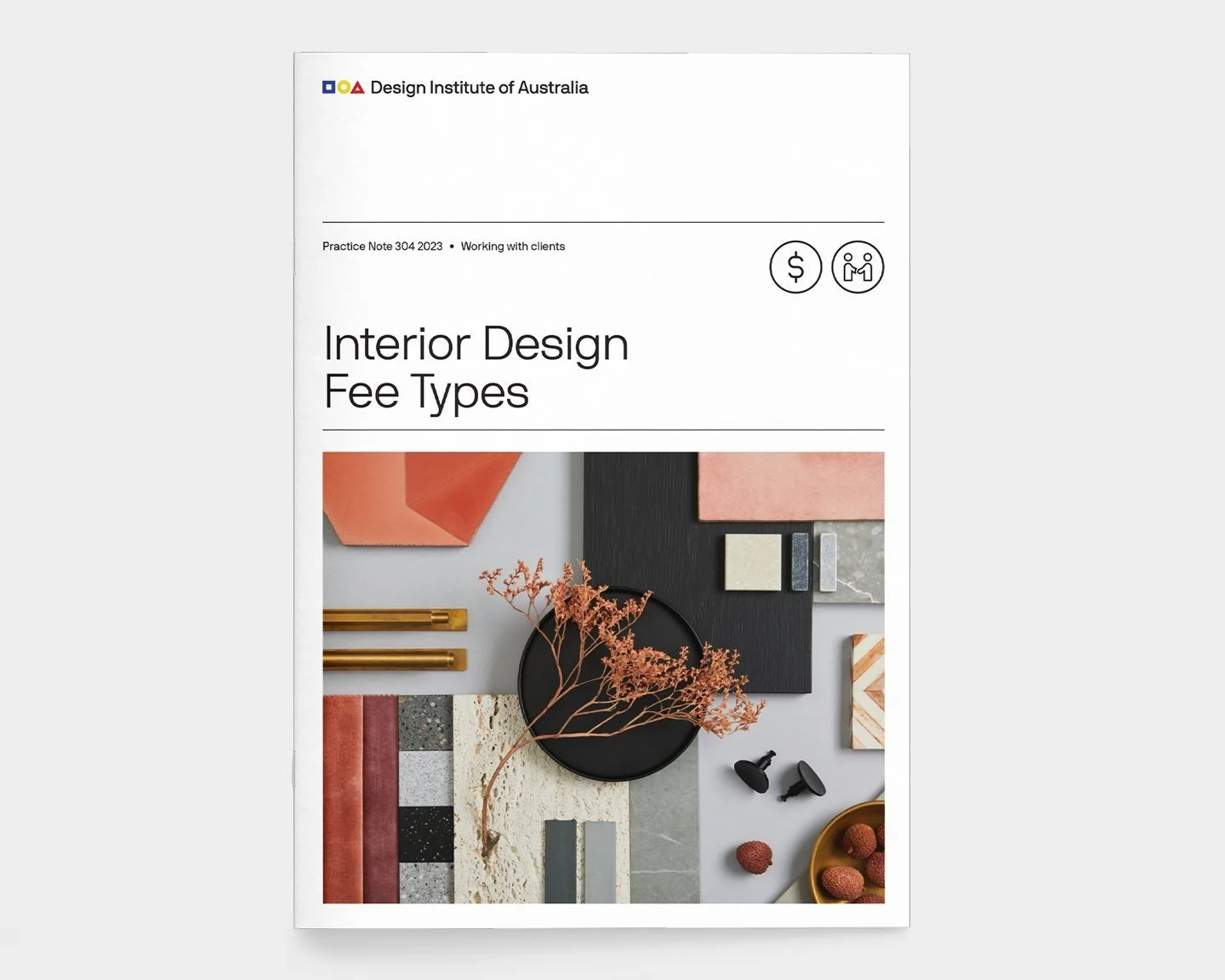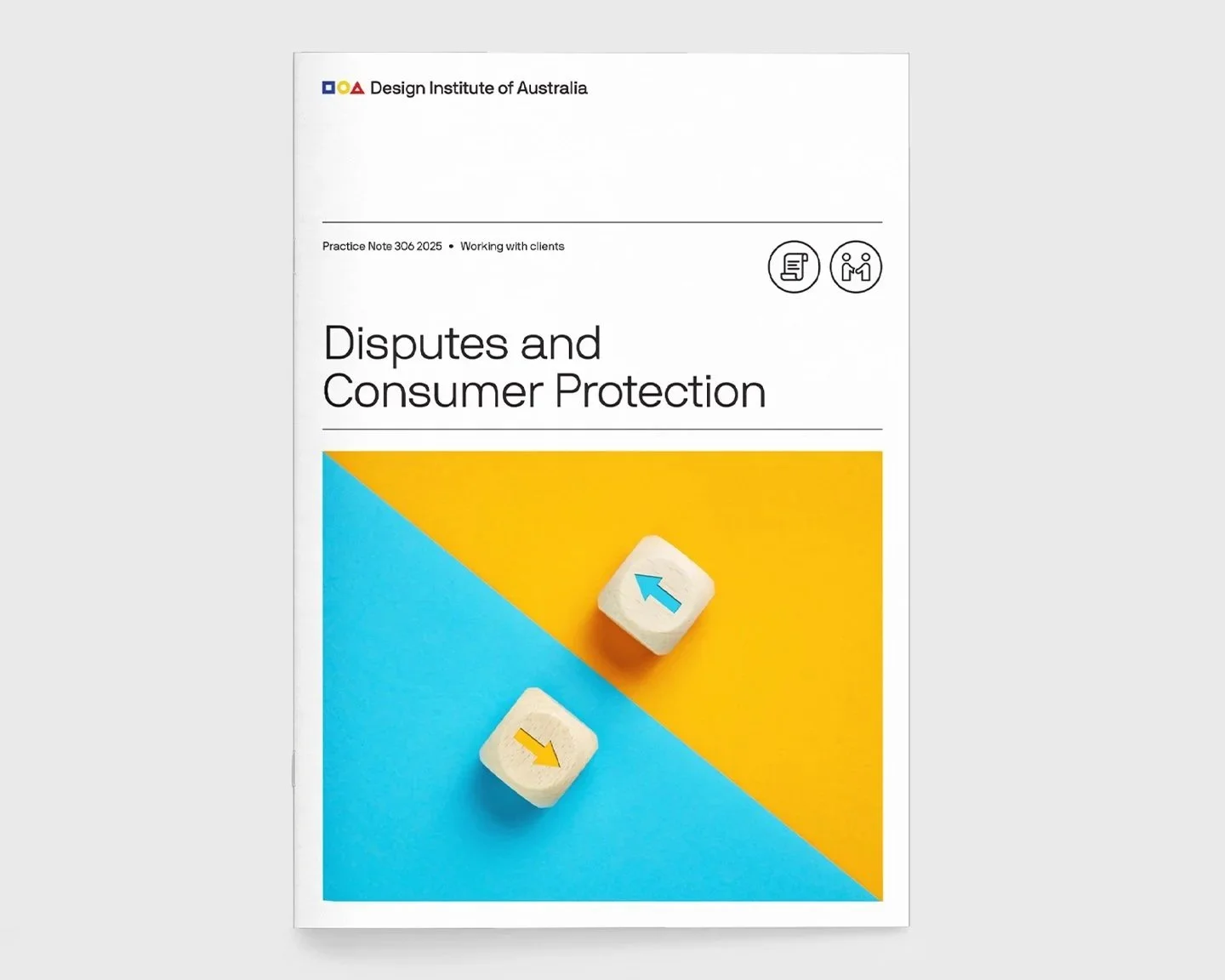 Image 1 of 9
Image 1 of 9

 Image 2 of 9
Image 2 of 9

 Image 3 of 9
Image 3 of 9

 Image 4 of 9
Image 4 of 9

 Image 5 of 9
Image 5 of 9

 Image 6 of 9
Image 6 of 9

 Image 7 of 9
Image 7 of 9

 Image 8 of 9
Image 8 of 9

 Image 9 of 9
Image 9 of 9










Working with Clients Practice Notes
The DIA series of Practice Notes on Working with Clients cover all the ins and outs of establishing and maintaining effective practices when you’re providing design services for clients.
From setting fair terms in your contracts to understanding different fee types, these handy guides will help you focus on building your client base with the reassurance you have your paperwork in place. The series includes an explainer on intellectual property so you’ll know how to protect your design rights, and a detailed process for resolving disputes if an issue should arise with a client.
The Working with Clients series includes the following titles:
Confidentiality Agreement
Contract Guidelines
Disputes and Consumer Protection
Fees and Services
Intellectual Property for Designers
Interior Design Fee Types
Generative AI and AGI – Artificial General Intelligence
Industrial Design Fee Types
Confidentiality Agreement: From time to time clients may require you to sign a form to control the disclosure of commercially sensitive information during business transactions. The following is an example of a form used by clients. Alternatively, there may be circumstances when you may require your subcontractors to sign such a form.
Contract Guidelines: General outline of designer and client responsibilities in relation to contracts and the preparation of briefs. Use as a checklist when formulating contracts or price submissions.
Disputes and Consumer Protection: This Practice Note outlines the Design Institute of Australia’s policy and process for resolving disputes relating to design services and protecting consumers of design professional services.
Fees and Services: Fee types and fee scheduling used in consulting design including some sample forms for determining and communicating fees.
Intellectual Property for Designers: This Practice Note explains all the types of Intellectual Property protections available to designers, and the differences between Design Rights, Patent and Copyright. It suggests simple ways to ensure that your work is protected and what to do if your work is copied.
Interior Design Fee Types: There are a number of methods of charging fees for residential interior designers and decorators. Consultants and their clients are free to negotiate on any basis whatsoever. The most common methods are outlined in this practice note.
Generative AI and AGI – Artificial General Intelligence: The DIA's Generative AI and AGI – Artificial General Intelligence Practice Note is a must-read for all designers and creative industry executives and a critical resource for all design organisations.
Industrial Design Fee Types: There are a number of methods of charging fees for industrial design. At times it may be appropriate to charge using different methods for different aspects of a project. The most common methods are outlined in this practice note.
About the DIA's Practice Notes
The DIA’s Practice Notes give designers the fundamentals to take control of their careers and flourish at work. The series has had its first major overhaul in over a decade. The refreshed notes provide more relevant guidance for contemporary workplaces and is available free for all designers who are members of the DIA.
The Practice Notes cover topics such as conditions of engagement, confidentiality agreements, preparing for staff reviews, understanding intellectual property and how to set fees for design services. As well as updating existing titles in the series the project has identified new topics covering issues designers face at different stages of their careers, such as supply chain transparency and responding to requests for free pitches.
The different topics in the series are organised by themes:
Designers in Australia
Working as a Designer
Working with Clients
Running an Office
Buying Design Services
The DIA series of Practice Notes on Working with Clients cover all the ins and outs of establishing and maintaining effective practices when you’re providing design services for clients.
From setting fair terms in your contracts to understanding different fee types, these handy guides will help you focus on building your client base with the reassurance you have your paperwork in place. The series includes an explainer on intellectual property so you’ll know how to protect your design rights, and a detailed process for resolving disputes if an issue should arise with a client.
The Working with Clients series includes the following titles:
Confidentiality Agreement
Contract Guidelines
Disputes and Consumer Protection
Fees and Services
Intellectual Property for Designers
Interior Design Fee Types
Generative AI and AGI – Artificial General Intelligence
Industrial Design Fee Types
Confidentiality Agreement: From time to time clients may require you to sign a form to control the disclosure of commercially sensitive information during business transactions. The following is an example of a form used by clients. Alternatively, there may be circumstances when you may require your subcontractors to sign such a form.
Contract Guidelines: General outline of designer and client responsibilities in relation to contracts and the preparation of briefs. Use as a checklist when formulating contracts or price submissions.
Disputes and Consumer Protection: This Practice Note outlines the Design Institute of Australia’s policy and process for resolving disputes relating to design services and protecting consumers of design professional services.
Fees and Services: Fee types and fee scheduling used in consulting design including some sample forms for determining and communicating fees.
Intellectual Property for Designers: This Practice Note explains all the types of Intellectual Property protections available to designers, and the differences between Design Rights, Patent and Copyright. It suggests simple ways to ensure that your work is protected and what to do if your work is copied.
Interior Design Fee Types: There are a number of methods of charging fees for residential interior designers and decorators. Consultants and their clients are free to negotiate on any basis whatsoever. The most common methods are outlined in this practice note.
Generative AI and AGI – Artificial General Intelligence: The DIA's Generative AI and AGI – Artificial General Intelligence Practice Note is a must-read for all designers and creative industry executives and a critical resource for all design organisations.
Industrial Design Fee Types: There are a number of methods of charging fees for industrial design. At times it may be appropriate to charge using different methods for different aspects of a project. The most common methods are outlined in this practice note.
About the DIA's Practice Notes
The DIA’s Practice Notes give designers the fundamentals to take control of their careers and flourish at work. The series has had its first major overhaul in over a decade. The refreshed notes provide more relevant guidance for contemporary workplaces and is available free for all designers who are members of the DIA.
The Practice Notes cover topics such as conditions of engagement, confidentiality agreements, preparing for staff reviews, understanding intellectual property and how to set fees for design services. As well as updating existing titles in the series the project has identified new topics covering issues designers face at different stages of their careers, such as supply chain transparency and responding to requests for free pitches.
The different topics in the series are organised by themes:
Designers in Australia
Working as a Designer
Working with Clients
Running an Office
Buying Design Services















